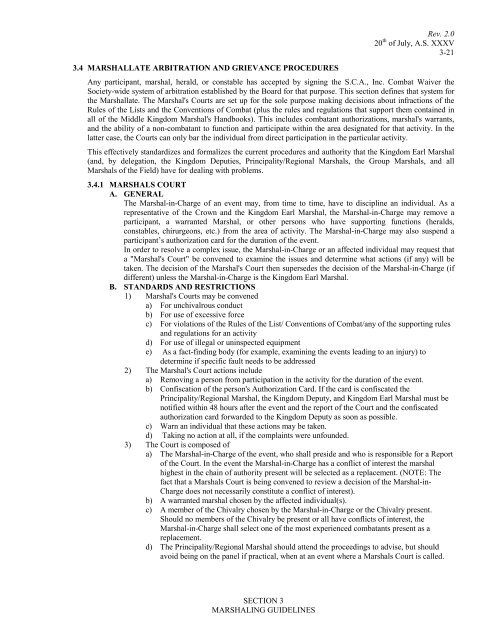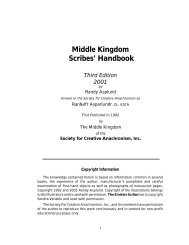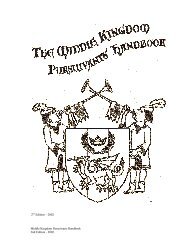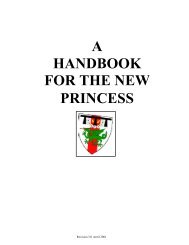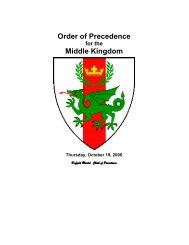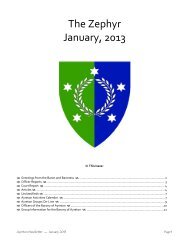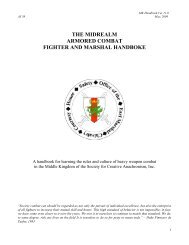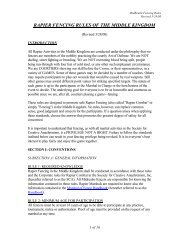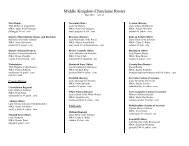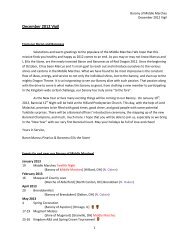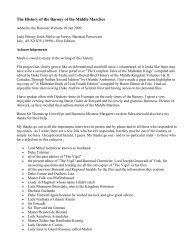Rapier Marshals Handbook - Midrealm / Middle Kingdom
Rapier Marshals Handbook - Midrealm / Middle Kingdom
Rapier Marshals Handbook - Midrealm / Middle Kingdom
Create successful ePaper yourself
Turn your PDF publications into a flip-book with our unique Google optimized e-Paper software.
SECTION 3<br />
MARSHALING GUIDELINES<br />
Rev. 2.0<br />
20 th of July, A.S. XXXV<br />
3-21<br />
3.4 MARSHALLATE ARBITRATION AND GRIEVANCE PROCEDURES<br />
Any participant, marshal, herald, or constable has accepted by signing the S.C.A., Inc. Combat Waiver the<br />
Society-wide system of arbitration established by the Board for that purpose. This section defines that system for<br />
the Marshallate. The Marshal's Courts are set up for the sole purpose making decisions about infractions of the<br />
Rules of the Lists and the Conventions of Combat (plus the rules and regulations that support them contained in<br />
all of the <strong>Middle</strong> <strong>Kingdom</strong> Marshal's <strong>Handbook</strong>s). This includes combatant authorizations, marshal's warrants,<br />
and the ability of a non-combatant to function and participate within the area designated for that activity. In the<br />
latter case, the Courts can only bar the individual from direct participation in the particular activity.<br />
This effectively standardizes and formalizes the current procedures and authority that the <strong>Kingdom</strong> Earl Marshal<br />
(and, by delegation, the <strong>Kingdom</strong> Deputies, Principality/Regional <strong>Marshals</strong>, the Group <strong>Marshals</strong>, and all<br />
<strong>Marshals</strong> of the Field) have for dealing with problems.<br />
3.4.1 MARSHALS COURT<br />
A. GENERAL<br />
The Marshal-in-Charge of an event may, from time to time, have to discipline an individual. As a<br />
representative of the Crown and the <strong>Kingdom</strong> Earl Marshal, the Marshal-in-Charge may remove a<br />
participant, a warranted Marshal, or other persons who have supporting functions (heralds,<br />
constables, chirurgeons, etc.) from the area of activity. The Marshal-in-Charge may also suspend a<br />
participant’s authorization card for the duration of the event.<br />
In order to resolve a complex issue, the Marshal-in-Charge or an affected individual may request that<br />
a "Marshal's Court" be convened to examine the issues and determine what actions (if any) will be<br />
taken. The decision of the Marshal's Court then supersedes the decision of the Marshal-in-Charge (if<br />
different) unless the Marshal-in-Charge is the <strong>Kingdom</strong> Earl Marshal.<br />
B. STANDARDS AND RESTRICTIONS<br />
1) Marshal's Courts may be convened<br />
a) For unchivalrous conduct<br />
b) For use of excessive force<br />
c) For violations of the Rules of the List/ Conventions of Combat/any of the supporting rules<br />
and regulations for an activity<br />
d) For use of illegal or uninspected equipment<br />
e) As a fact-finding body (for example, examining the events leading to an injury) to<br />
determine if specific fault needs to be addressed<br />
2) The Marshal's Court actions include<br />
a) Removing a person from participation in the activity for the duration of the event.<br />
b) Confiscation of the person's Authorization Card. If the card is confiscated the<br />
Principality/Regional Marshal, the <strong>Kingdom</strong> Deputy, and <strong>Kingdom</strong> Earl Marshal must be<br />
notified within 48 hours after the event and the report of the Court and the confiscated<br />
authorization card forwarded to the <strong>Kingdom</strong> Deputy as soon as possible.<br />
c) Warn an individual that these actions may be taken.<br />
d) Taking no action at all, if the complaints were unfounded.<br />
3) The Court is composed of<br />
a) The Marshal-in-Charge of the event, who shall preside and who is responsible for a Report<br />
of the Court. In the event the Marshal-in-Charge has a conflict of interest the marshal<br />
highest in the chain of authority present will be selected as a replacement. (NOTE: The<br />
fact that a <strong>Marshals</strong> Court is being convened to review a decision of the Marshal-in-<br />
Charge does not necessarily constitute a conflict of interest).<br />
b) A warranted marshal chosen by the affected individual(s).<br />
c) A member of the Chivalry chosen by the Marshal-in-Charge or the Chivalry present.<br />
Should no members of the Chivalry be present or all have conflicts of interest, the<br />
Marshal-in-Charge shall select one of the most experienced combatants present as a<br />
replacement.<br />
d) The Principality/Regional Marshal should attend the proceedings to advise, but should<br />
avoid being on the panel if practical, when at an event where a <strong>Marshals</strong> Court is called.


